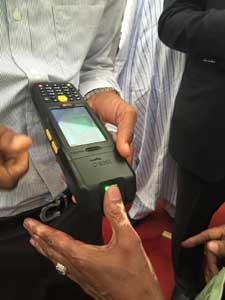
THE Supreme Court, yesterday, explained why it has not accorded any probative value on reports from Card Reader Machines that were deployed by the Independent National Electoral Commission, INEC, during the 2015 general elections. The apex court, yesterday, maintained that though the use of the Electronic Card Reader Machine for accreditation of voters was provided for in the Approved Guidelines and Regulations for the conduct of the 2015 general elections, it said the device was never “intended to supplant, displace or supersede” the Voters’ Register.
It observed that the issue had resulted to various Divisions of the Court of Appeal, giving divergent interpretations on election disputes that were brought before them by appellants. “True, indeed, the Card Reader Machine traces its paternity to the above Guidelines and Regulations. Regrettably, its probative pedestal in the vocabulary of electoral jurisprudence has generated conflicting interpretations from Their Lordships of the different Divisions of the Court of Appeal”, the Supreme Court noted.
A seven-man panel of Justices of the apex court, led by the Chief Justice of Nigeria, Justice Mahmud Mohammed, made the position of the court on the matter known, while adducing reasons why the election of Governor David Umahi of Ebonyi State was upheld. According to Justice Chima Centus Nweze who delivered the lead judgment,
“With the intervention of this court, in its recent decision in Shinkafi v Yari (supra), it is hoped that practitioners and all other courts will begin to appreciate the position of the said Card Reader Machine, and the Reports generated therefrom, in election litigation. “Prior to the authorisation of its use by the Guidelines and Manual (supra), the Electoral Act, 2010 (as amended), in sections 49 (1) and (2), had ordained an analogue procedure for the accreditation process.
As a corollary to the procedure outline above, section 53(2) of the said Act (that is, the Electoral Act) enshrined the consequences for the breach, negation or violation of the sanctity of the actual poll sequel to the consummation of the accreditation procedure in section 49 (supra).
“With the advantage of hindsight, INEC, pursuant to its powers under the said Electoral Act, authorised the deployment of the said Card Readers. “Even with the introduction of the said device, that is the Card Reader Machine, the National Assembly, in its wisdom, did not deem it necessary to bowdlerise the said analogue procedure in section 49 from the Act so that the Card Reader procedure would be the sole determinant of a valid accreditation process.
“Contrariwise, from the Corrigendum No 2, made on March 28, 2015, amending paragraph 13(b) of the Approved Guidelines, it stands to reason that the Card Reader was meant to supplement the Voter’ Register and was never designed or intended to supplant, displace or supersede it.
“Indeed, since the Guidelines and Manual, which authorised the use and deployment of the electronic Card Reader Machine, were made in exercise of the powers conferred by the Electoral Act, the said Card Reader cannot, logically, depose or dethrone the Voters’ Register whose judicial roots are, firmly, embedded or entrenched in the selfsame Electoral Act from which it )the Voters’ Register). Directly, derives its sustenance and currency.
 THE Supreme Court, yesterday, explained why it has not accorded any probative value on reports from Card Reader Machines that were deployed by the Independent National Electoral Commission, INEC, during the 2015 general elections. The apex court, yesterday, maintained that though the use of the Electronic Card Reader Machine for accreditation of voters was provided for in the Approved Guidelines and Regulations for the conduct of the 2015 general elections, it said the device was never “intended to supplant, displace or supersede” the Voters’ Register.
THE Supreme Court, yesterday, explained why it has not accorded any probative value on reports from Card Reader Machines that were deployed by the Independent National Electoral Commission, INEC, during the 2015 general elections. The apex court, yesterday, maintained that though the use of the Electronic Card Reader Machine for accreditation of voters was provided for in the Approved Guidelines and Regulations for the conduct of the 2015 general elections, it said the device was never “intended to supplant, displace or supersede” the Voters’ Register.

Be the first to comment